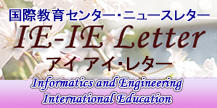IE-IEレター* Letter 2. ~海外での大学院生活について~ 対談:エドガーさん、大石伸之さん
Edgar and Nobu talk about Studying at Graduate School Abroad
電気通信大学にて大学院生活を送るエドガーさんと、これから海外にて大学院生活を送る予定のノブさんの対談です。海外にて大学院生活を送る時に相応しい心の持ち方とはどんなものがあるのでしょうか。


エドガー(マルチネス・ノリエガ・エドガー・ホサファット)さんと、ノブ(大石 伸之)さん
Edgar Josafat Martinez NORIEGA and Nobuyuki OISHI
Nobu:
Nice to meet you, Edgar. Let's begin with brief introductions of ourselves.
My name is Nobuyuki Oishi. I was born and raised in Shizuoka prefecture and moved to Tokyo when I entered UEC in 2012. I completed my Master's study at UEC last March under Professor Masayuki Numao of “I” department*. I got a scholarship from JASSO for studying overseas and will be doing my Ph.D. study at the University of Sussex in the UK from next January.
Edgar:
My full name is MARTINEZ NORIEGA Edgar Josafat, and I am currently 31 years old. I am originally from Mexico City, from a town called Tlaltenco. I study on I.P.N. ESIME "Culhuacan", a major in Computer Engineering.
Nobu:
First, could you let us know why you chose Japan, and why UEC?
Edgar:
My first time in Japan was in my 4th year of the bachelor's. I came as a part of the JUSST program (1-year exchange program). At that time my older brother was in UEC as well, enrolled in the Ph.D. program. Since I was a kid, I felt encouraged to come to Japan due to the cultural exposure from anime and Nintendo. I put all my energy to get a scholarship and finally got a 1-year exchange program and later got another scholarship from the Japanese government to pursue my Master's and Ph.D. studies.
Nobu:
So, your older brother was here at UEC first, and you also made great efforts to come here. That’s a good story.
Edgar:
Why did you choose the UK?
Nobu:
Well, it is mainly because I found a professor whose research interests fit what I want to pursue in my Ph.D. In other words, I didn’t start searching from countries. When I came across with exciting and matching research areas, themes or studies, I decided to work with the researcher who does it. Also, Europe seems to be actively trying to improve human health and wellness technologies, for example, Human Activity Recognition, which is one of my main motivations for going there.
By the way, how did you find the research or Post-Doctoral positions at other universities after your Ph.D.?
Edgar:
I am currently waiting to start a Post Doctoral position at the Tokyo Institute of Technology. I got this position through the networking I created during my master's and Ph.D. course.
Nobu:
Congratulations on getting the post-doc position at TiTech! I am also interested in why you chose academia over industry as a researcher in computer science. You could consider some influential and global companies in the industry such as Google and Facebook.
Edgar:
I did choose the industry at first. I was doing job hunting to get a position in some companies. However, due to recent events of the COVID-19 pandemic, the search turned difficult. Then, I found another option through academia being in the current Post Doctoral position.
Nobu:
Sorry to hear that. Actually, my overseas study is also affected by COVID-19. My initial plan was to go to the UK this September, but it has been postponed. Talking about studying abroad, you have a lot of experiences. What advice do you think you can give me in this respect?
Edgar:
Yes. I think that a Ph.D. course is like running a marathon. Some of us start the race very fast and hard... and burn out really quickly. So, one good advice is to keep a good pace about research life and personal life. Work hard in the lab but also take some personal time to enjoy British culture and events.
Nobu:
That's valuable advice. I heard that burnout is a common issue for Ph.D. students. Could you give me some tips on how to survive hard times in a Ph.D. student life?
Edgar:
I think having a lot of good friends helped a lot. I like social events and drinking. We created a good circle between me and my friends. We all give pieces of advice and compared experiences in order to overcome difficult times. Also, getting closer to Japanese culture and manners helped me a lot. Sometimes, there is no manual on how to do things. Luckily my senpais (先輩) supported me a lot.
Nobu:
I see. Having friends and supportive senpais, sharing thoughts, and understanding the culture of the country are vital. I will keep them in mind and put them to good practice. Thank you very much for talking with me!
Conclusion:
Edgar:
I think that when we live abroad for a long period of time (+1 year), it is very important to really know the manners and culture of the place. We might think that the world works in the same way as it does in the place we are born… but it is not the case. Especially when we study in a foreign country. However, meeting people, sharing ideas makes a stronger and better way of thinking for us. As well is one of the most valuable benefits of the international programs in my opinion.
* Shortened name for Department of Information Network Systems.
※この記事は2020年9月3日(木)に行われたオンラインインタビューに基づいています。インタビューの模様の一部はショート-ビデオクリップで見ることができます。
作成日:2020年11月 4日 / 更新日:2020年11月26日






